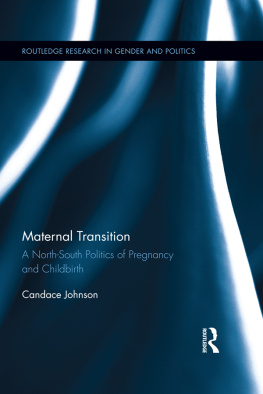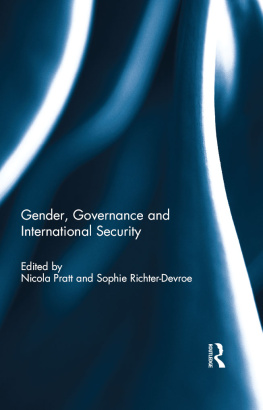Lives of Incarcerated Women
Drawing on qualitative and quantitative research from around the world, this book brings together renowned international scholars to explore life-course perspectives on womens imprisonment. Instead of covering only one aspect of womens carceral experiences, this book offers a broader perspective that encompasses womens pathways to prison, their prison experiences and the effects of these experiences on their childrens well-being, as well as their subsequent chances of desisting from crime.
Encompassing perspectives from the Netherlands, Belgium, Denmark, Scotland, the United States, Ukraine and Sri Lanka, this book uncovers the similarities across time and space in women offenders life histories and those of their children and examines the differences in womens experiences and trajectories by shedding light on the moderating effects of particular cultural contexts.
Lives of Incarcerated Women will be of interest to academics and students engaged in the study of punishment, penology, life-course criminology, women and crime and gender studies. It will also be of great interest to practitioners.
Candace Kruttschnitt is a Professor of Sociology at the University of Toronto and served as President of the American Society of Criminology. She received her PhD from Yale University and her research has focused on women offenders, the victimization of women and female inmates. She is the author and editor of several books and government reports related to female offending, victimization and imprisonment.
Catrien Bijleveld studied Psychology and Criminal Law, both at Leiden University. Her PhD was on the statistical analysis of categorical time series. After working as an Assistant Professor at Leiden University she moved to the WODC Research and Documentation Center of the Netherlands Ministry of Justice. In 2001, she moved to NSCR in Leiden, and became Professor of Criminological Research Methods at the VU University in Amsterdam.
Routledge frontiers of criminal justice
1 Sex Offenders: Punish, Help, Change or Control?
Theory, policy and practice explored
Edited by Jo Brayford,
Francis Cowe and John Deering
2 Building Justice in Post-Transition Europe
Processes of criminalisation within Central and Eastern European societies
Edited by Kay Goodall, Margaret Malloch and Bill Munro
3 Technocrime, Policing and Surveillance
Edited by Stphane Leman-Langlois
4 Youth Justice in Context
Community, compliance and young people
Mairead Seymour
5 Women, Punishment and Social Justice
Human rights and penal practices
Margaret Malloch and Gillian McIvor
6 Handbook of Policing, Ethics and Professional Standards
Edited by Allyson MacVean, Peter Spindler and Charlotte Solf
7 Contrasts in Punishment
An explanation of Anglophone excess and Nordic exceptionalism
John Pratt and Anna Eriksson
8 Victims of Environmental Harm
Rights, recognition and redress under National and International law
Matthew Hall
9 Doing Probation Work
Identity in a criminal justice occupation
Rob C. Mawby and Anne Worrall
10 Justice Reinvestment
Can the criminal justice system deliver more for less?
Chris Fox, Kevin Albertson and Kevin Wong
11 Epidemiological Criminology
Theory to practice
Edited by Eve Waltermaurer and Timothy A. Akers
12 Policing cities
Urban securitization and regulation in a 21st century world
Edited by Randy K. Lippert and Kevin Walby
13 Restorative Justice in Transition
Kerry Clamp
14 International perspectives on police education and training
Edited by Perry Stanislas
15 Understanding Penal Practice
Edited by Ioan Durnescu and Fergus McNeill
16 Perceptions of Criminal Justice
Vicky De Mesmaecker
17 Transforming Criminal Justice?
Problem-solving and court specialization
Jane Donoghue
18 Policing in Taiwan
From authoritarianism to democracy
Liqun Cao, Lanying Huang and Ivan Y. Sun
19 Reparation for Victims of Crimes against Humanity
The healing role of reparation
Edited by Jo-Anne M. Wemmers
20 Victims of Violence and Restorative Practices
Finding a voice
Tinneke Van Camp
21 Long-Term Imprisonment and Human Rights
Edited by Kirstin Drenkhahn, Manuela Dudeck and Frieder Dnkel
22 Working within the Forensic Paradigm
Cross-discipline approaches for policy and practice
Edited by Rosemary Sheehan and James Ogloff
23 Positive Criminology
Edited by Natti Ronel and Dana Segev
24 Inmates Narratives and Discursive Discipline in Prison
Rewriting personal histories through cognitive behavioral programs in prison
Jennifer A. Schlosser
25 Municipal Corporate Security in International Context
Kevin Walby and Randy K. Lippert
26 Victims and Restorative Justice
Edited by Ivo Aertsen, Inge Vanfraechem and Daniela Bolivar
27 The Role of Community in Restorative Justice
Fernanda Fonseca Ronseblatt
28 Lives of Incarcerated Women
An international perspective
Edited by Candace Kruttschnitt and Catrien Bijleveld
This ambitious book provides a unique window into a complex yet largely under-researched topicthe lives of incarcerated women. The collection of papers offers both wide coverage and rich insights. The authors have captured the complexities of the diverse suite of vulnerabilities faced by incarcerated women, illustrating the many hurdles which impact upon further offending and victimization risks. The editors are to be commended for pulling off this substantial volume, which is a must-read for scholars, students, and practitioners with an interest in understanding victimization and offending across the life-course and, most importantly, the unique circumstances of incarcerated women.
Paul Mazerolle, Professor of Criminology, Griffith University, Australia
This much-needed book illuminates the lives of incarcerated women and offers new ways of thinking about risk and resilience. The chapters and the book as a whole fully reflect a life course perspective, highlighting that the womens challenges and vulnerabilities do not start or end with the incarceration experience itself. The result is a nuanced portrait that captures the play of gender against the broader landscape of particular structural and cultural contingencies, and recognizes the immediacy of the world of personal relationships (e.g., romantic partners, children, police) the women must continually navigate.
Peggy C. Giordano, Distinguished Professor of Sociology, Department of Sociology, Bowling Green State University, USA





